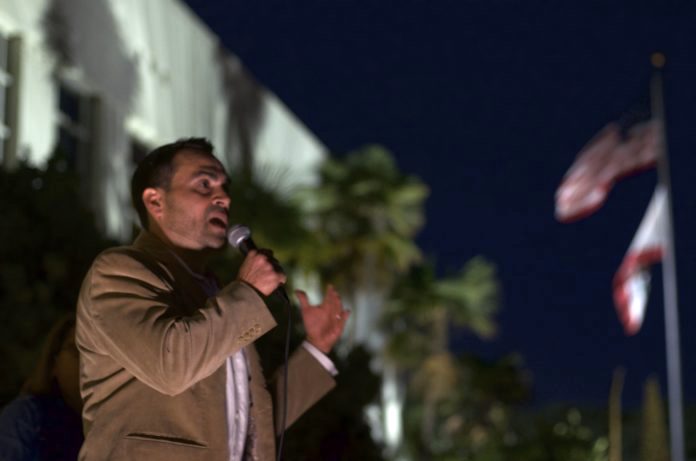Council to decide this week whether Councilmember Oscar de la Torre has a conflict of interest in case Pico Neighborhood Association v. City of Santa Monica
By Sam Catanzaro
Santa Monica lawmakers will determine this week whether a Councilmember can participate in decisions relating to a major voting rights case against the city, a case in which the Councilmember’s wife is a plaintiff.
The case filed by plaintiffs Pico Neighborhood Association, Maria Loya and Advocates for Malibu Public Schools alleges that Santa Monica’s at-large election system dilutes Latino voting power in violation of the California Voting Rights Act (CVRA) and discriminates against Latino voters in violation of the Equal Protection Clause of the California Constitution.
In a ruling released February 15, 2019, Los Angeles Superior Court Judge Yvette M. Palazuelos ordered that all future elections for seats on the Santa Monica City Council be based on a seven-district map drawn by an expert for the plaintiffs, including a 30 percent Latino district. The City then appealed this decision.
On July 9, 2020, the California 2nd District Court of Appeal ruled in favor of the city saying that Latinos, who account for 14 percent of Santa Monica’s electorate, lack the numbers to win an election in the 30 percent Latino district ordered by Judge Palazuelos.
After the Appeals Court rejected a petition for a hearing, the plaintiffs filed their case with the California Supreme Court. On October 21 the Supreme Court took up the case, depublishing the Appellate Court ruling. The court has granted the City an extension until March 22 to file its answer brief on the appeal’s merits.
At the January 26 Santa Monica City Council meeting, lawmakers will vote on whether Councilmember Oscar de la Torre can participate in discussions and decisions relating to the case. De la Torre’s wife is plaintiff Maria Loya and until November 2020 he served on the Pico Neighborhood Association’s board.
Santa Monica Interim City Attorney George Cardona, in a staff report, recommends that the Council decide de la Torre has a common law conflict of interest, disqualifying him from participating in or attempting to influence discussions or decisions relating to the case.
“It seems difficult to imagine that Councilmember de la Torre has no private or personal interest in the outcome of the pending litigation where his wife remains a plaintiff in the litigation, his wife remains a board member of the other plaintiff in the litigation, and, until shortly before being sworn in as a councilmember, he was the chair of the board of the other plaintiff in the litigation and served as that plaintiff’s representative at deposition and trial,” Cardona wrote. “If Council determines that a common law conflict of interest exists and Councilmember de la Torre is, therefore, disqualified, then all subsequent discussions and actions relating to the litigation should be treated in the same way as if Councilmember de la Torre recused himself, that is, Councilmember de la Torre may not be present during any discussions or decisions related to the litigation.”
Separately, the City has sought formal advice from the California Fair Political Practices Commission (FPPC) as to whether de la Torre has a financial conflict of interest. The City has not yet received advice on these issues from the FPPC. When reached for comment, de la Torre said “I plan to abide by the advice of the FPPC or the [California] Attorney General but we haven’t received their directive.”
“I want our City Council to stop wasting tax payer dollars on an ego driven, self serving legal adventure. The Councilmembers and City Attorney Cardona who have decided to waste public dollars on this case are the ones with a bigger conflict and frankly lack credibility or objectivity on the matter,” de la Torre added.
Kevin Shenkman, a counsel for the plaintiffs, told the Santa Monica Mirror that de la Torre should be allowed to participate and make decisions surrounding the litigation.
“He is entitled to and should vote in connection with the system of elections and the case Pico Neighborhood Association v. City of Santa Monica,” Shenkman said. “He was elected in no small part due his position on district elections and minority rights more generally. I think the voters of Santa Monica know who Oscar is. He has been a figure in Santa Monica for decades and a figure in Santa Monica politics for at least two decades now. This should come as no surprise.”
Shenkman also argued that there is no such thing as a non-financial conflict of interest.
“The only type of conflict of interest in California is a financial conflict of interest. There is no such thing as a non-financial conflict of interest. Non-financial conflicts of interests are simply that people believe very strongly in a particular issue. Just like Sue Himmelrich believes very strongly in affordable housing. And Kevin McKeown believes very strongly in environmental issues. And Gleam Davis believes very strongly in hyper-density. Oscar de la Torre, from my discussions with him, believes very strongly in minority voting rights and there is no reason why he should recuse himself in this matter. He was elected to represent people who share his views and that is what he is doing,” Shenkman said. “The City Council does not have the authority to exclude one of its members from discussion, deliberations and decisions the City Council is making.”













